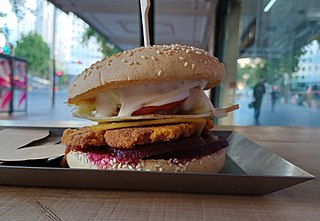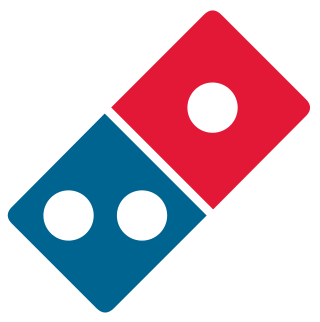
Pizza Hut is an American multinational pizza restaurant chain and international franchise founded in 1958 in Wichita, Kansas by Dan and Frank Carney.
Pak'nSave is a New Zealand discount food supermarket warehouse chain owned by the Foodstuffs cooperative. It is one of the three main supermarket chains in New Zealand, alongside Countdown and New World. There is a total of 57 Pak'nSave stores throughout the country.

Lemon & Paeroa, often shortened to L&P, is a sweet, lemon-flavoured soft drink manufactured in New Zealand. The drink is considered Kiwiana, and was traditionally made by combining lemon juice with naturally carbonated mineral water from the town of Paeroa. Today, it is manufactured by multi-national Coca-Cola. The origin date of the drink is uncertain, but the brand estimates 1907.
Farmers Trading Company Ltd is a New Zealand mid-market department store chain. Headquartered in Flat Bush, Auckland, Farmers operates 59 stores across New Zealand, specialising in family fashion, beauty, homewares, furniture, large appliances and whiteware.

Fast food advertising promotes fast food products and utilizes numerous aspects to reach out to the public.

Restaurant Brands New Zealand Limited, trading as Restaurant Brands, is a New Zealand fast food company. Restaurant Brands currently operates and owns the master franchising rights for the Carl's Jr., KFC, Pizza Hut, and Taco Bell brands in New Zealand. Restaurant Brands operates most of New Zealand's stores for the brands they own rights to and provides management and support services to New Zealand's independent franchisees of the remaining stores.

BurgerFuel is a New Zealand burger restaurant and franchise with 72 locations in three countries, including 60 locations in New Zealand.

Domino's Pizza Enterprises Limited (DPE) is the largest pizza chain in Australia in terms of network stores numbers and network sales, as well as the largest franchisee for the US Domino's Pizza brand in the world. DPE is the exclusive master franchise for the Domino's brand network in Australia, New Zealand, Belgium, France, The Netherlands, Japan, Germany, Luxembourg, Denmark and Taiwan. Across these markets, DPE has over 2,800 stores. In May 2005 DPE became the first publicly listed pizza company in Australia.
As far back as the 1970s, international fast food restaurant chain Burger King has attempted to introduce a premium line of burgers. These sandwiches are part of a system which eventually became known as the barbell strategy; a plan designed to expand Burger King's menu with both more sophisticated, adult-oriented fare along with products that are more value-oriented. This program is intended to bring in a larger, more affluent adult audience who will be willing to spend more on the better quality products on one side while maintaining a lower cost value menu dedicated to a more cost-conscious audience on the other. The hope is that the customers would be drawn in initially for the lower prices of the value-menu and upgrade to the more expensive products, upping overall sales.

The New Zealand Media Council is a non-governmental organisation which exists to uphold standards in the New Zealand media industry and promote freedom of speech in New Zealand. Founded in 1972 as the New Zealand Press Council, it is enabled to hear complaints against newspapers and other publications, particularly regarding allegations of bias and inaccuracy. It can order an offending publication to publish a summary of the Council's ruling, and will generally specify the prominence of the summary.
Demon Energy is an energy drink produced in New Zealand by Davies Foods. It is sold in 250ml aluminium cans, 500ml aluminium cans, 600ml, 1 litre and 1.5 litre plastic bottles. During 2009, Demon Energy released 60ml energy shots. These are made to be drank at room temperature so can be stored anywhere easily, and can be bought in packs of ten.
Michael Hill International Ltd. is a speciality retailer of jewellery. As of April 2023, it operates 281 stores in Australia, New Zealand and Canada. The Group employs approximately 2,600 permanent employees. The company's headquarters are in Brisbane, Australia.
Electric Kiwi is an independent online New Zealand electricity retailer.
2 Cheap Cars is a used car dealership group in New Zealand. It was founded in 2011 by Eugene Williams and Yusuke Sena. The company specialise in selling Japanese imported cars in New Zealand.

The global COVID-19 pandemic had a significant impact on the New Zealand economy. New Zealand has a mixed economy – a free market with some state ownership and control. In mid-March 2020, the New Zealand Government imposed a four-tier alert level system, which placed much of the country's economy into lockdown with the exception of "essential services" such as supermarkets. Due to the success of the Government's elimination strategy, lockdown restrictions on various economic activities were progressively lifted between April and June 2020.
Australian Liquor Marketers is the liquor arm of Metcash. It distributes liquor to businesses around Australia and New Zealand, and runs a franchise of almost 2900 liquor stores operating as The Bottle-O, Cellarbrations, IGA Liquor, Duncans, Thirsty Camel, Big Bargain, Porters and Merchants Liquor.
The hospitality industry in New Zealand is a major industry operating around the country. It is one of the largest employment sectors in the country, contributing about 1.7% of GDP, equivalent to NZ$5 billion annually.

Voices for Freedom (VFF) is an anti-vaccine advocacy group in New Zealand that formed in December 2020 to oppose the New Zealand Government's COVID-19 mitigation policies and vaccination rollout. The organisation is founded and led by food blogger and former Advance New Zealand candidate Claire Deeks, Libby Jonson and Alia Bland. Voices for Freedom has been criticised by NZ Skeptics, The Spinoff editor Madeleine Chapman, and "FACT Aotearoa" for spreading misinformation about COVID-19 and vaccinations.











